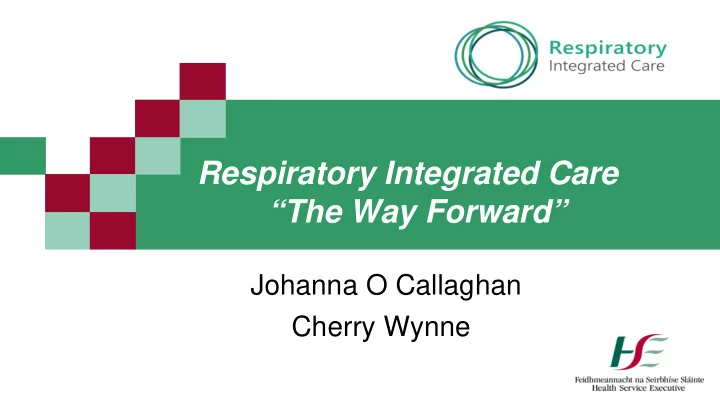

Respiratory Integrated Care “The Way Forward” Johanna O Callaghan Cherry Wynne
Chronic Respiratory Disease in Ireland Respiratory disease accounted for the highest proportion of in-patient hospitalisations and bed days compared to other diseases (2009 – 2016). In 2016, 92,391 inpatient hospitalisations and 578,319 in-patient bed days.
The majority of hospitalisations for respiratory disease were emergencies (18.7% of all emergency hospitalisations). Respiratory consultations account for 14.5% of GP visits (GMS & GP visit card holders).
Chronic Obstructive Pulmonary Disease (COPD) The prevalence of COPD in Ireland is unknown. COPD places a significant burden of disease on people and health services in Ireland. It is a leading cause of death from respiratory disease.
Asthma Ireland has one of the highest rates of asthma in the world. Current estimates suggest that the prevalence of doctor-diagnosed asthma in adults is 7-9.4%. More than one person dies per week from asthma. Costs the economy €500m a year.(ASI Data)
Perceived barriers to effective management of chronic diseases within the Irish healthcare Service Lack of appropriate funding. Increased workload/Lack of time. Poor communication between hospital teams and general practitioners. Lack of ongoing access to hospital consultants for advice. Lack of skills and education/ knowledge gaps.
What is Integrated Care? The most common definition of integration comes from the World Health Organisation: “ The organisation and management of health services so that people get the care they need, when they need it, in ways that are user friendly, achieve the desired results and provide value for money.”
Respiratory Integrated Care in DNCC The programme provides the services of a CNSp +/- physiotherapist to both primary and secondary care. The first RIC post in DNCC commenced in April 2016, with second CNSp joining in Feb 2017.
Aims of RIC To provide expert diagnosis and care in an integrated manner. Access to spirometry in the community for diagnosis and accurate staging of disease. To foster the ethos of self-management in the patient and the GP team. To share expert knowledge and skills with general practice staff. To reduce emergency attendance at GP, Out of Hours, Emergency Departments and Hospital admissions.
Caseload Patients on treatment for or diagnosed with Asthma who are poorly controlled as evidenced by their attendance with an asthma exacerbation (in the previous six months) to the following services: - GP X 2 visits - GPOOH - ED Dept - Admission to hosp
Patients on treatment for or diagnosed with COPD who are poorly managed as evidenced by their attendance (in the previous six months) with chest infections or persistent/increasing dyspnoea: - GP X 2 visits - GPOOH - ED Dept - Admission to hosp
CNSp interventions include: Disease-specific education +/- Spirometry. Medication management (including adherence and inhaler technique). Smoking Cessation support. Individualised Action/Management plans. Exercise and physical activity advice. Breathing management. Knowledge of bronchial hygiene techniques. Nutrition advice. Stress management.
To Date : 40 participating GP Practices. Patients seen in practice setting (80%) or in Primary Care Centre (20%). 421 new patients seen, 62% of these have also had a review consultation. 65 % female. 80% (n = 338) have had a Spirometry test. 68% have received self management plans.
Evaluation 40% demonstrated a MID in disease specific symptom scores. Only 10% referred on to Secondary care for further diagnostic tests +/- review. 32% have had a change in diagnosis (e.g. ACO, Asthma to COPD, Bronchiectasis, Interstitial Lung disease, Obstructive Sleep Apnoea, GORD, Lung Cancer).
Education Primary Care: Multi disciplinary team. Practice Nurses. GP’s. GP Registrars. Mountjoy Prison!
Patient Experience Questionnaire 54 PEQ’s returned. 60% response rate. Anonymous questionnaire.
How confident are you that you understand your lung condition?
How confident are you that you understand your medication/inhalers?
GP Questionnaire - Feedback Posted to 14 participating GP practices.78.5% response rate!
Questionnaire Comments “ I loved the fact that “Excellent service. the Respiratory Nurse Patients managed was able to come to extremely well and my GP building which efficiently”. in turn made me feel comfortable”. “Nurse increased my knowledge of my “Love the condition in a very convenience of professional but friendly local and not environment”. hospital”.
Nurse Run Asthma Clinic in Primary Care 18 n=115, 12 month study. Comparisons made 12 months pre & post clinic. 50% reduction in GP consultations. Reduced need for oral steroid bursts: 57% to 25%. Number of patients requiring acute nebulisation: 17% to 6%. 80% had changes to their asthma medications. 9% DNA rate after initial appoinment.
Impact of integrated disease management (IDM) in high risk COPD patients in primary care One year multicenter randomised controlled trial (n = 180). 81% completed the study. In IDM group: Significantly fewer severe exacerbations (- 48.9%), reduced urgent primary care visits (- 30.2%) and reduced ED visits (- 23.6%). Statistically significant improvements in Lung Function,Qol scores, Clinical COPD Questionnaire and Bristol COPD Knowledge Questionnaire.
In Conclusion Integrated Care is viable option for Respiratory Patients. Efficacious and potential cost savings. It has allowed patients to be diagnosed and treated in Primary Care.
Any Questions?
Recommend
More recommend